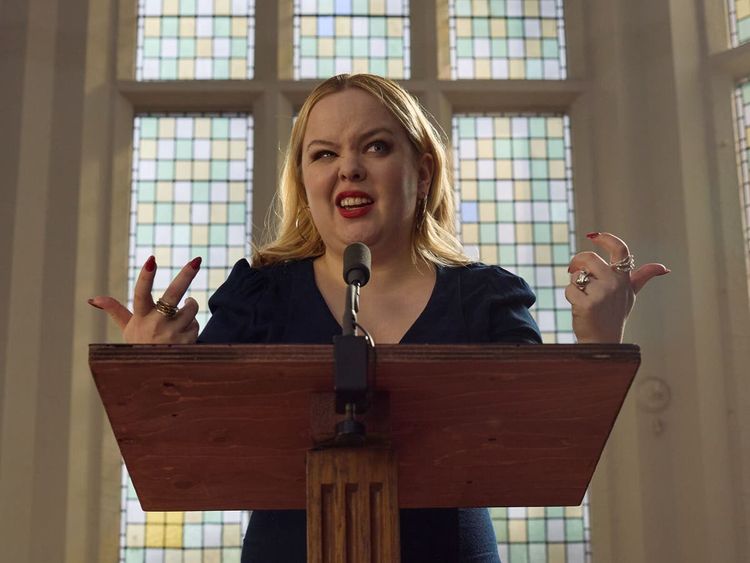In Big Mood, Nicola Coughlan has enormous fun as an anxious do-badder – review

Get Breaking News Alerts In Real-time By Signing Up For Our Email Updates, For Free!
Get Our Breaking News Emails For Free By Signing Up
There was a period a little while back where modern sitcoms featured a group of yuppies with plenty of money to spend on silly antics. They lived in luxurious homes in some of the most expensive cities in the world. However, within the last few years, things have shifted. The tone now has a sense of disappointment: jobs that involve analyzing data have replaced unfulfilled creative aspirations, money is scarce, and shared housing has become a norm over complex penthouses. Big Mood, a new comedy airing on Channel 4, delves into the struggles of two best friends trying to navigate through this transition into adulthood.

In the show, Nicola Coughlan plays Maggie, a writer who is dealing with her mental illness while pursuing her passion for writing. Her friend Eddie, played by Lydia West, is her anchor in the chaos of her life as a struggling playwright. However, as Maggie's birthday approaches and she seeks to unlock her creativity by stopping her prescribed lithium medication, things take a turn for the worse. At the same time, Eddie is pressured by her unsavory brother to sell her failing bar. Maggie declares that she wants to be a better person as she enters her thirties, but her journey to self-improvement proves more challenging than she anticipated.
The actress Coughlan, known for playing anxious, well-meaning characters in the shows "Derry Girls" and "Bridgerton," is having a blast playing an anxious troublemaker in this new role. Her character, Maggie, is a charming and chaotic mess, and Coughlan does a great job blurring the line between Maggie's natural eccentricity and her bipolar disorder. It's hard to tell where the theatrical performance ends and the manic episode begins. Maggie protests that her behavior isn't just a mood, it's a real mental disorder. Her performance is lively and full of energy, in contrast to West's straight-laced portrayal of Eddie. There are also some great guest appearances by Sally Phillips as a clumsy psychiatrist, Max Bennett as Lydia's obnoxious ex-boyfriend Jonah, and David Bedella as the sleazy businessman, Clyde. The show is centered around Maggie's whirlwind of a personality, and the various characters who are pulled into her orbit.
The term "big mood" is internet slang that refers to something relatable, even if it seems exaggerated or stylized. It's like when Peggy Olson from Mad Men wears sunglasses, has a cigarette in her mouth, and carries a box of office junk as she leaves work - that's a big mood. Sometimes, though, it feels like "big mood" is just trying to get a reaction from people. For example, when Maggie shows up to her old school in a revealing outfit to seduce her former teacher, or when she drinks champagne in a dirty, graffiti-covered bathroom - those are big moods too. It's hard to decide whether to criticize Maggie for her self-destructive actions or to glorify them for emotional impact, which makes the portrayal of mental illness in "big mood" both intriguing and unclear.
Maggie says she's really good at dealing with depression and has learned how to handle it well. The creator, Coughlan, portrays Maggie's bipolar disorder in a powerful way, but the comedy in Big Mood isn't as polished. The writer, Camilla Whitehill, is primarily a playwright like Maggie and has worked with Coughlan on a comedy podcast called Whistle Through the Shamrocks. However, the humor in Big Mood doesn't stand out and is overshadowed by the seriousness of Maggie's problems. Although Maggie is similar to Hannah Horvath in Girls, the tone of the humor is more like Fleabag, being dark and uneasy. But because there aren't many jokes and they're not very funny, the balance between light and dark is off.
The outcome is a sequence that contains a vast amount of skill into six short 25-minute episodes, however, it never appears to be conclusive and instead feels like a rushed job. It's unsure whether it ought to be raw or fancy, genuine or bizarre, sorrowful or cheerful. Truth be told, even though having a sitcom based on mental health instead of who's hooking up in a friendship clique, sounds interesting, unfortunately, the show lacks humor. It's not amusing and is apprehensive with a feeling of being inadequate. That quite possibly could be the prevailing impression of it all.











































